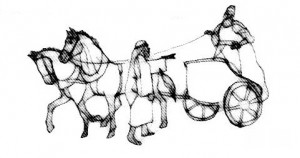03: The Unlikely Missionary – Lesson Plan
Key Thought : God doesn’t always use the faithful and dedicated church members to witness for Him. He has used proud and boastful men and cross-cultural witnessing as well in presenting the plan of salvation.

Image © Lars Justinen Goosalt.com
[Lesson plan for The Unlikely Missionary July 13, 2015]
1. Have a volunteer read 2 Kings 5:1-7.
a. Ask class members to share a thought on what the most important point in this text is.
b. Why would the Syrians even listen to the words of a captive slave girl?
c. Personal Application: What does this tell us about how our faith, lifestyle, and actions can draw others to us and the truths about God? Share your thoughts.
d. Case Study: One of your relatives states: “How can we learn to live with the good and bad in our lives? Troubles may lead people to seek God, but He doesn’t always heal the afflictions.” How would you respond to your relative?
2. Have a volunteer read 2 Kings 2:9-15.
a. Ask class members to share a short thought on what the most important point is in this passage.
b. What did it mean for Elisha to want a double portion of Elijah’s spirit? What does it imply?
c. Personal Application: Have you dedicated yourself to God, asking Him to use us or His mission? How can we be ready for Him to use us? Share your thoughts.
d. Case Study: One of your friends states, “Elijah was translated to heaven. Elisha got a double portion of his spirit; yet he was mocked, ridiculed, and died a slow, painful death from disease. What does this tell us about following God and doing His will in our lives?” How would you respond to your neighbor?
3. Have a volunteer read 2 Kings 5:11-14.
a. Ask class members to share a short thought on what the main idea of this text is.
b. Why was Elisha not courteous enough to come out and at least meet Naaman face to face, instead of sending a messenger and staying in the house?
c. Personal Application: Is there any task in the church or in the process of repentance that you are loathe to do? That may be too humiliating, too humbling to work out? Share your thoughts..
d. Case Study: One of your neighbors states, “This man was a proud leader who did not know God, but only wanted cleansing from leprosy. Why did Elisha give him a chance to be healed from his leprosy by washing in the Jordan?” How would you respond to your friend?
4. Have a volunteer read 2 Kings 5:15,16.
a. Ask class members to share a short thought on what the main idea of this text is.
b. What did Naaman learn from his experience with his leprosy, the slave girl,the prophet, and his own servants?
c. Personal Application: Why is it better to help people and not take a reward, than to help them and let them repay you? Share your thoughts.
d. Case Study: Think of one person who needs to hear a message from this week’s lesson. Tell the class what you plan to do this week to share with them.
(Note : “Truth that is not lived, that is not imparted, loses its life-giving power, its healing virtue. Its blessings can be retained only as it is shared.” MH p. 149.
